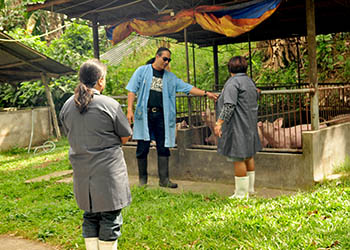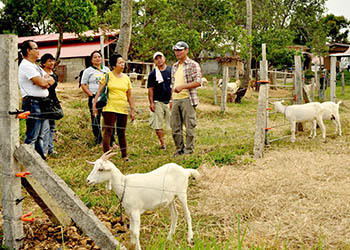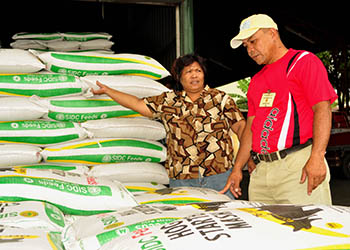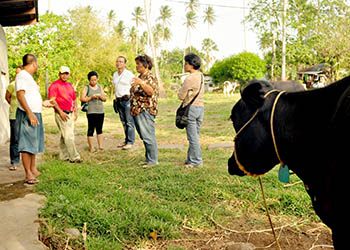Story by Irene Lacia | Executive Director | Heed Foundation
Story and Photos by Jun Ayensa | Regional Program Manager | Heifer Southern Philippines

HINIUSA's Chairperson and Golden Talent Award recipient Luzvisminda Sinagan, Vice President Reynaldo Renopal, HEED Project Coordinator Irene Lacia and Executive Director Fernando Salise took part in the visit. "The study tour is very fulfilling," Sinagan said. "We have gained valuable lessons and seeing the dairy farms and cooperatives made the learning curve shorter."

The group visited existing cooperatives and institutions that manage and operate a smallholder swine production system and profitable feed mill enterprise in Luzon. The visiting team plans to expand HINIUSA's existing feed mill and swine production project in Agusan del Sur. It also aims to educate the team on the Philippines' value chain concepts of the swine, poultry and dairy industry.
After Typhoon Bopha hit Agusan del Sur in December 2012, Heifer International provided immediate assistance with food and roofing materials for 366 affected project partner families. With the continuing support of Heifer, the HEED Foundation and HINIUSA originally aimed to rehabilitate farmers' livelihoods that were destroyed along with the community's farmlands and livestock.
The group visited the Sorosoro Ibaba Development Cooperative (SIDC) in Batangas City and CAFFMACO in Silang, Cavite, which are engaged in feed mill enterprise operations and management integrating swine production and dispersal through contract growing, collective marketing of live hogs, meat processing and marketing, and the establishment of consumer stores and meat shops. These are diversified with other income-generating activities such as catering services, water refilling, a truck-weighing scale, laboratory testing, and a gasoline station, which directly contribute to increasing income and employment among smallholder farmers.

With the feed mill enterprise, corn farmers and other agricultural producers are encouraged to develop their agricultural farms and reap a better harvest. They are assured of their market to cater to the demand of raw materials, particularly corn and soybean products for the feed mill. Corn and soybeans are the primary ingredients in feed processing.
Providing swine stock and feed assistance to smallholder swine raisers through contract growing is a very strategic mechanism. Regular provisions of required feed and veterinary products are essential support toward quality products. Similarly, smallholder swine raisers benefit from increased income and improved nutrition. Through collective marketing, high market demands and access to high market prices are encouraging and contributing factors.
The International Training Center on Pig Husbandry of Lipa Batangas taught the group proper operation and management of multi-sow level breeding and marketing, including proper use of animal waste through the installation of a biodigester and organic fertilizer processing. The small and commercial sow levels with the corresponding recommended design and measurement of the building were also introduced.

Also visited were the Palcon Dairy Cooperative in Sariaya, Quezon Province and St. Elmo's Farm in Nasugbo, Batangas, engaged in dairy goat and native pig production and marketing. At Palcon, the group saw household-based smallholder livestock practices with milk production and marketing. Fresh milk is collected every morning and afternoon through the use of a communal milking pallor or a machine, while the cooperative pasteurizes the product before marketing. This is the same process used on Elmo's Farm with fresh goat milk collection and cheese processing. These endeavors concretely address malnutrition cases, especially among children.
Feed mill products that have been produced and marketed to smallholder farmers for dairy animals present an opportunity for HINIUSA to support Heifer's dairy project in Caraga, which would ensure feed mill operations are viable and sustainable. The group also saw that every family member can participate and be involved in the whole endeavor. Engagements in agriculture-based social enterprise projects likes these create opportunities to generate income and employment among Caraga farmers.